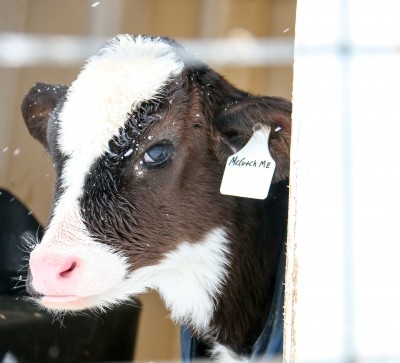Preparing for Dairy Calf Care in Winter
Alycia Drwencke, Dairy Management Specialist
Southwest New York Dairy, Livestock and Field Crops Program

Preparing for Dairy Calf Care in Winter
Cornell Cooperative Extension shares best management practices for dairy calf care during cold weather
By Alycia Drwencke, Dairy Management Specialist, with the SWNY Dairy, Livestock, and Field Crops Program
SOUTHWEST, NY (November 5, 2020) - Cornell Cooperative Extension's Southwest New York Dairy, Livestock, and Field Crops Program shares best management considerations for taking care of dairy calves in cold weather.
With temperatures dropping and the first snow flying, it is important to confirm farms are ready for the winter. While animal care is a top priority for dairy farms year round, there are some additional considerations to keep in mind during cold months, especially for vulnerable groups like calves. Ensuring our calf care is up to date for the winter season can set them up for success in the future.
There are three top considerations for calves during the winter: maintaining body temperature, ventilation, and nutrition. While these areas are important year-round, they become even more critical in cold weather. Beginning with body temperature, calves are born with only 2-4% body fat, making them susceptible to freezing. Providing calves an adequate amount of clean, soft, dry bedding can help them stay warm. In cold weather, it is recommended to provide calves with straw that is deep enough they can nestle into. The University of Wisconsin has developed a nesting score card which describes a score of 3 as ideal for winter where the calves legs should generally not be visible when they lay down. Additionally, calf coats or jackets can be put on in extreme weather, but should be examined for proper fit, dryness, and cleanliness.
Monitoring ventilation during winter is important for preventing an increase of dust, moisture, pathogens, risk of pneumonia, and other respiratory issues. Providing good ventilation at a rate of 4 air exchanges per hour while avoiding drafts is critical to promoting calf health. Some farms choose to move calves from an outdoor housing system into a barn for additional weather protection. This can be a useful management tool if ventilation in the barn is sufficient. Farms that continue to utilize outdoor based systems should ensure calves have protection from strong winds with plenty of soft, dry bedding.
Finally, it is important to increase the quantity of milk calves receive for growth and warmth. Additional calories are burned by calves in the winter to keep warm, making an increased milk quantity without compromising quality vital. Calves can consume 16 liters of milk per day with no negative health effects. Calves are also susceptible to dehydration during cold weather, making water provision essential. A plan for providing calves with clean, fresh, non-frozen water should be communicated with all caretakers.
Providing additional care to calves during the winter, especially in the areas of maintaining body temperature, ventilation, and nutrition can set a dairy herd up for success. For more information about caring for dairy calves in the winter, contact Alycia Drwencke, Dairy Management Specialist, at 517-416-0386 or amd453@cornell.edu.
Upcoming Events
WEBINAR - Automated Milking Systems Efficiency: Balancing Focus on Individual Cows and System Optimization
May 8, 2024
Please join Cornell the SWNY team and MSU Extension for our talk with Dr. Pablo Silva Boloña on improving efficiency of Automated milking systems by focusing on milking settings for individual and group success.
Broiler Field Day at Sunny Cove Farm
June 6, 2024
Alfred Station, NY
Join us for a field day to explore broiler production, processing, and finances. Meghan Snyder of Sunny Cove Farm will be our host. She raises small batches of organic broilers, processing them on-farm under the 1,000 bird exemption.
Stockmanship and Stewardship 2024
October 25, 2024
Hamburg, NY
Save the date!! The event is one of 4 across the US and is a two-day educational experience featuring low-stress cattle handling demonstrations, Beef Quality Assurance educational sessions, facility design sessions, and industry updates.
Announcements
No announcements at this time.





